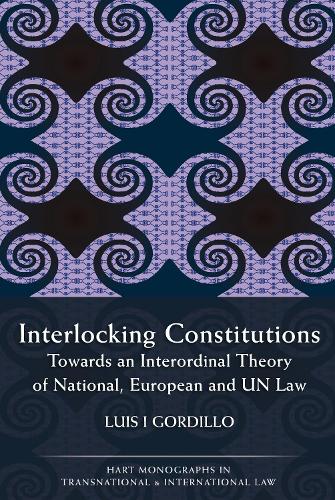
Interlocking Constitutions: Towards an Interordinal Theory of National, European and UN Law
(Hardback)
Publishing Details
Interlocking Constitutions: Towards an Interordinal Theory of National, European and UN Law
By (Author) Luis I Gordillo
Bloomsbury Publishing PLC
Hart Publishing
25th April 2012
United Kingdom
Classifications
Professional and Scholarly
Non Fiction
Laws of specific jurisdictions and specific areas of law
341
Physical Properties
Hardback
410
Width 156mm, Height 234mm, Spine 22mm
800g
Description
The existence of interactions between different but overlapping legal systems has always presented challenges to black letter law. This is particularly true of the relationship between international law and domestic law and the relationship between federal law and the laws of individual federation members. Moreover some organisations have created their own supranational constitutional systems: the United Nations Charter is the best known, and is often referred to as the 'World Constitution', but the European Court of Justice in Luxembourg views the European Treaties as a 'Constitutional Charter' for Europe, while the European Court of Human Rights has defined the European Convention on Human Rights as a constitutional instrument of 'European public order'. It is in the dynamic relationship between domestic constitutional laws, EU law, the ECHR and the UN Charter that the most persistent difficulties arise. In this context 'interordinal instability' not only provokes strong academic interest, but also affects what has been called 'governance' or 'global government' and undermines both legal certainty and individual fundamental rights. Different solutions - constitutionalist and pluralist - have been explored, but none of them has received global acceptance. In this book Luis Gordillo analyses the interordinal instabilities which arise at the European level, focusing on three main strands of case law and their implications: Solange, Bosphorus and Kadi. To solve the difficulties caused by this instability Gordillo proposes a form of soft constitutionalism, which he calls 'interordinal constitutionalism', as a means to bring order and stability to global legal governance. The original Spanish thesis on which this book is based was awarded the Nicols Prez Serrano Prize by the Centro de Estudios Polticos y Constitucionales, for the best dissertation in constitutional law 2009-2010.
Reviews
Finalmente, hay que decir que, en conjunto, la capacidad cientfica y de abstraccin de la que hace gala el professor de la Universidad de Deusto es extraordinaria. Ha aportado una nueva perspective del Derecho internacional, a mi juicio, jams as tratada, y de calidad descomunal. -- Por Alberto Oehling de Los Reyes * Anuario Iberoamericano de Justica Constitucional, Volume 16 *
One of the merits of this book, together with its richness in terms of information and investigation and despite the incredible amount of literature existing in this field, is that Gordillo manages to find an autonomous collocation in such a scholarly ocean by making his argument very clear. Even the structure of the work reflects the rigorous methodology chosen for this intellectual enterprise...it is well documented and presents an originality of its own. -- Giuseppe Martinico * Common Market Law Review *
an eminently readable, insightful book. Gordillo is on to something, and hopefully further research will be done, by him and by others, exploring the full potential of his 'interordinal constitutionalist' approach as an alternative to other existing models. -- Lucas Lixinski * British Yearbook of International Law, Volume 82, No.1 *
Author Bio
Luis I Gordillo is an Associate Professor at the University of Deusto, Bilbao.
